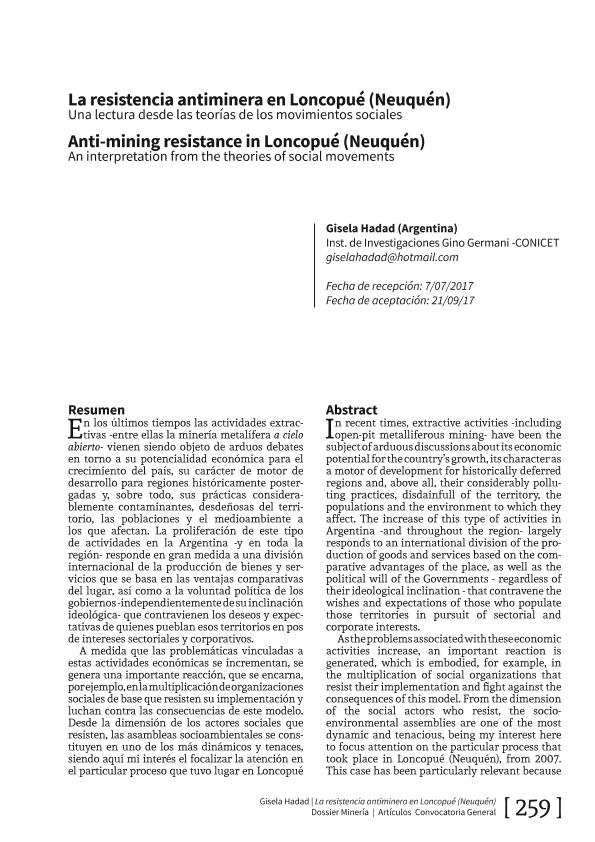Mostrar el registro sencillo del ítem
dc.contributor.author
Hadad, María Gisela

dc.date.available
2019-04-26T18:25:53Z
dc.date.issued
2017-10
dc.identifier.citation
Hadad, María Gisela; La resistencia antiminera en Loncopué (Neuquén) : Una lectura desde las teorías de los movimientos sociales
; Universidad Nacional de San Juan. Facultad de Ciencias Sociales. Instituto de Investigaciones Socioeconómicas; Rev IISE; 10; 10; 10-2017; 259-272
dc.identifier.issn
2250-5555
dc.identifier.uri
http://hdl.handle.net/11336/75136
dc.description.abstract
En los últimos tiempos las actividades extractivas –entre ellas la minería metalífera a cielo abierto– vienen siendo objeto de arduos debates en torno a su potencialidad económica para el crecimiento del país, su carácter de motor de desarrollo para regiones históricamente postergadas y, sobre todo, sus prácticas considerablemente contaminantes, desdeñosas del territorio, las poblaciones y el medioambiente a los que afectan. La proliferación de este tipo de actividades en la Argentina –y en toda la región– responde en gran medida a una división internacional de la producción de bienes y servicios que se basa en las ventajas comparativas del lugar, así como a la voluntad política de los gobiernos –independientemente de su inclinación ideológica– que contravienen los deseos y expectativas de quienes pueblan esos territorios en pos de intereses sectoriales y corporativos.A medida que las problemáticas vinculadas a estas actividades económicas se incrementan, se genera una importante reacción, que se encarna, por ejemplo, en la multiplicación de organizaciones sociales de base que resisten su implementación y luchan contra las consecuencias de este modelo. Desde la dimensión de los actores sociales que resisten, las asambleas socioambientales se constituyen en uno de los más dinámicos y tenaces, siendo aquí mi interés el focalizar la atención en el particular proceso que tuvo lugar en Loncopué (Neuquén), a partir de 2007. Este caso ha sido especialmente relevante por presentar una lucha conjunta de organizaciones de distinto tipo –dos asambleas vecinales, una comunidad indígena y una organización campesina– articuladas ex profeso en defensa de su territorio, y por lograr llevar a cabo un referéndum popular sobre la posibilidad de prohibir la minería a gran escala en el lugar. Estos hechos, sus alcances e implicancias son lo que me pretendo estudiar aquí, en una propuesta de análisis desde las teorías de los movimientos sociales.
dc.description.abstract
In recent times, extractive activities -including open-pit metalliferous mining- have been the subject of arduous discussions about its economic potential for the country’s growth, its character as a motor of development for historically deferred regions and, above all, their considerably polluting practices, disdainfull of the territory, the populations and the environment to which they affect. The increase of this type of activities in Argentina -and throughout the region- largely responds to an international division of the production of goods and services based on the comparative advantages of the place, as well as the political will of the Governments - regardless of their ideological inclination - that contravene the wishes and expectations of those who populate those territories in pursuit of sectorial and corporate interests. As the problems associated with these economic activities increase, an important reaction is generated, which is embodied, for example, in the multiplication of social organizations that resist their implementation and fight against the consequences of this model. From the dimension of the social actors who resist, the socioenvironmental assemblies are one of the most dynamic and tenacious, being my interest here to focus attention on the particular process that took place in Loncopué (Neuquén), from 2007. This case has been particularly relevant because it presents a joint struggle of organizations of different types - two neighborhood assemblies, an indigenous community and a peasant organization - articulated in defense of their territory, and for achieving a popular referendum on the possibility of prohibiting large-scale mining in the area. These facts, their scope and implications are what I intend to study here, in a proposal of analysis from the theories of social movements.
dc.format
application/pdf
dc.language.iso
spa
dc.publisher
Universidad Nacional de San Juan. Facultad de Ciencias Sociales. Instituto de Investigaciones Socioeconómicas
dc.rights
info:eu-repo/semantics/openAccess
dc.rights.uri
https://creativecommons.org/licenses/by-nc-sa/2.5/ar/
dc.subject
Minería
dc.subject
Asambleas Ciudadanas
dc.subject
Mapuche
dc.subject
Neuquén
dc.subject.classification
Tópicos Sociales

dc.subject.classification
Sociología

dc.subject.classification
CIENCIAS SOCIALES

dc.title
La resistencia antiminera en Loncopué (Neuquén) : Una lectura desde las teorías de los movimientos sociales
dc.title
Anti-mining resistance in Loncopué (Neuquén) : An interpretation from the theories of social movements
dc.type
info:eu-repo/semantics/article
dc.type
info:ar-repo/semantics/artículo
dc.type
info:eu-repo/semantics/publishedVersion
dc.date.updated
2019-04-25T13:59:39Z
dc.journal.volume
10
dc.journal.number
10
dc.journal.pagination
259-272
dc.journal.pais
Argentina

dc.description.fil
Fil: Hadad, María Gisela. Universidad de Buenos Aires. Facultad de Ciencias Sociales. Instituto de Investigaciones "Gino Germani"; Argentina. Consejo Nacional de Investigaciones Científicas y Técnicas; Argentina
dc.journal.title
Rev IISE
dc.relation.alternativeid
info:eu-repo/semantics/altIdentifier/url/http://www.ojs.unsj.edu.ar/index.php/reviise/article/view/175
dc.relation.alternativeid
info:eu-repo/semantics/altIdentifier/url/https://dialnet.unirioja.es/servlet/articulo?codigo=6556716
Archivos asociados
